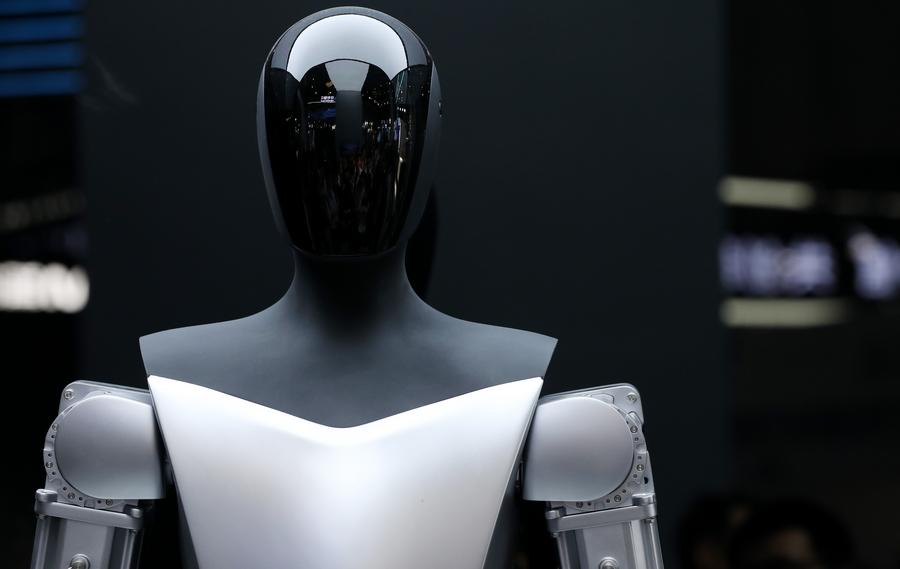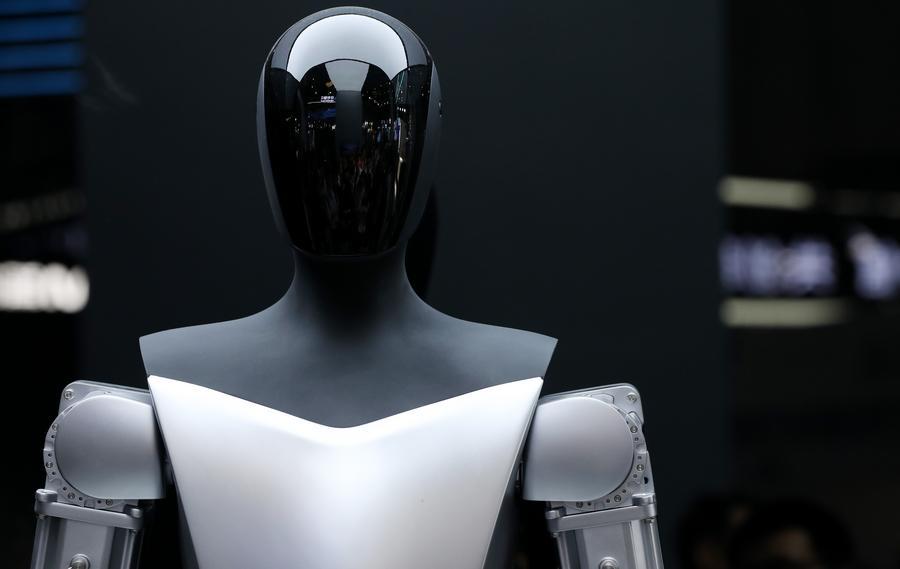
This photo taken on July 6, 2023 shows a robot from Tesla during the World Artificial Intelligence Conference (WAIC) 2023 in Shanghai, east China. (Xinhua/Fang Zhe)
BEIJING, March 21 (Xinhua) -- China's BYD and Lenovo announced to collaborate with U.S. computer giant Nvidia in fields including hardware support and platform development, during the Nvidia GPU Technology Conference (GTC) 2024 opened on Tuesday.
The Chinese AI market is holding huge potential, which means that Chinese enterprises should seize the opportunities brought about by the Artificial Intelligence (AI) Plus Initiative, developing high-level large model application products in different industries and increasing research and development of AI chips, as a bid to enhance the resilience of AI industrial chains.
-- Enormous potential of Chinese AI market
BYD will use Nvidia's next-generation car chip Thor, as well as Nvidia's AI infrastructure for autonomous driving model training, according to Jensen Huang, founder and CEO of Nvidia during GTC 2024.
Lenovo and Nvidia have announced to jointly launch a new integrated AI solution that allows enterprises and cloud service providers to gain accelerated computing capabilities critical for AI development.
Thanks to continuous improvements made in real-time computing, energy efficiency and ease of deployment, new application scenarios of AI are rapidly emerging, according to Kirk Skaugen, executive vice president of Lenovo and president of Lenovo's Infrastructure Solutions Group.
"Through its close collaboration with Nvidia, Lenovo has made significant progress in terms of efficiency, performance and cost, which not only accelerates the deployment of AI across various industries, but helps companies gain insights into data, taking improvements of retail experience, city appearance and smart manufacturing to the next level," said Skaugen.
Guests from China's Alibaba Cloud, Tencent Cloud, Baidu and Ant Group gave speeches at this year's GTC, where Nvidia set March 19 as the China AI Day.
"It is obvious that Nvidia has become more proactive in opening up to the Chinese market," said Zou Debao, deputy general manager of the Center for Artificial Intelligence Industry Research at CCID Consulting, noting that this will greatly promote the construction of global AI supply and industrial chains.
Heading toward AI Plus, China's AI industry is looking to realize the transformation of AI technological research achievements through the constructions of computing power centers and data elements, said Zou, pointing out that the ultimate goal is to replace old growth drivers of domestic industries with new ones through AI industrialization and boost the cultivation of new quality productive forces.
-- Cultivating core competitiveness
At present, the AI industry has become a highland of global technological development, making it full of vitality for economic growth.
According to data from the Ministry of Industry and Information Technology, the market size of China's core computing power industry reached 1.8 trillion yuan (about 250.02 billion U.S. dollars) in the year 2022, with computing power accelerating its application into various fields including government affairs, industry, transportation, medical care and so on.
As of the end of June 2023, the number of standard racks in use in China's data centers had exceeded 7.6 million units, and the country's scale in terms of computing power touched 197 EFLOPS, ranking second in the world. (EFLOPS is a unit of measurement for a computer's speed. A 1 EFLOPS computing system can complete 1 quintillion floating-point operations per second.)
Domestic computing power has so far shown good application results in the fields of automobiles, communications, sensors, intelligent transportation, etc., especially in non-immediate application scenarios, said Zou, noting that significant improvements have been seen in the domestic computing power industry in terms of the completeness of the industrial chain, the R&D capabilities of enterprises, and talent cultivation.
Innovations in application of large models will be the core competitiveness of China's AI enterprises, who should seize the opportunity of AI Plus to develop high-level large-scale model application products in different industries, said Zhao Gang, an analyst at the Beijing-based consultancy firm CIO Manage.
"Though people may have different understandings, but they share the same passion about the AI industry. We are indeed in an era featuring accelerated development of AI, when Chinese companies are also thinking about the direction of future development under this general trend," said Li Wei, a representative with Chinese AI company Mobvoi at GTC 2024. (Edited by Yu Huichen with Xinhua Silk Road, yuhuichen@xinhua.org)




 A single purchase
A single purchase









